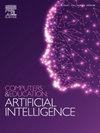Opportunities, challenges and school strategies for integrating generative AI in education
Q1 Social Sciences
Computers and Education Artificial Intelligence
Pub Date : 2025-01-25
DOI:10.1016/j.caeai.2025.100373
引用次数: 0
Abstract
The increasing accessibility of Generative Artificial Intelligence (GenAI) tools has led to their exploration and adoption in education. This qualitative study investigates the opportunities and challenges associated with integrating GenAI in education, and the strategies that encourage teachers and students to embrace GenAI in school settings. We recruited 76 educators in Canada to participate in a professional training seminar about GenAI and expressed their views through online surveys. Through written reflections, an optimistic outlook on GenAI's role in education was identified among the teachers, and some discipline-specific ideas were proposed. Thematic analysis reveals three key practices of AI implementation: teaching/learning, administration and assessments. However, three major challenges are also identified: school's readiness, teachers' AI competencies, and students' AI literacy and ethics. Teachers suggest several strategies to motivate GenAI integration, including professional development, clear guidelines, and access to AI software and technical support. Finally, Singh's Teach AI Global Initiative Guidance and Socio-ecological Model are adapted and proposed to support schools in becoming AI-ready by addressing teachers' and students' needs, facilitating organizational learning, and promoting improvement and transformation to foster their literacy development. Recommendations were provided for developing effective strategies to embrace GenAI in education.
求助全文
约1分钟内获得全文
求助全文
来源期刊

Computers and Education Artificial Intelligence
Social Sciences-Education
CiteScore
16.80
自引率
0.00%
发文量
66
审稿时长
50 days
 求助内容:
求助内容: 应助结果提醒方式:
应助结果提醒方式:


